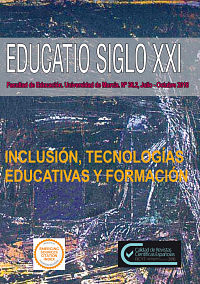Interculturality in Extremadura: Pending Tasks for a 21st Century Inclusive School
Abstract
The Autonomous Community of Extrema-dura (Spain) is one of the last regions in
the Western world to incorporate to its
schools a remarkable number of students
of foreign origin or ethnic and cultural mi-
norities. This research aims to verify the
pedagogical model from which intercul-
tural education is understood and worked
by teachers with a view to detecting their
training needs and to suggest the keys that
allow for the development of the intercul-
tural critical approach in primary and se-
condary schools in the region. To respond
to these objectives, a mixed research de-
sign was carried out using questionnaires,
interviews, discussion focus groups and
documentary analysis. The conclusions
obtained are rather nuanced but there is
a slight impact on the teachers’ perception
of multiculturalism, especially regarding
their daily work in the classroom and the
communication and disciplinary models
that are used in it. However, even when the teachers are still far from internalizing
a critical intercultural educational model,
they express concern and interest regar-
ding minority groups, which constitutes a
strong starting point for training work.
Downloads
-
Abstract939
-
PDF (Español (España))853
Original work publishes in this journal is subject to the following terms:
1. Murcia University Press (the publishing house) holds the copyright of the publishes work, and favours and allows their reutilization under the use license stated in point 2.
© Servicio de Publicaciones, Universidad de Murcia, 2015
2. Work is published in the electronic edition under a license (Creative Commons Reconocimiento-NoComercial-SinObraDerivada 4.0 España (legal text). They can be copied, used, disseminated, transmitted and publicly presented, as long as: i) authorship and original publication source is acknowledged (journal, publishing house and URL of the work); ii) are not used for commercial purposes; iii) the existence and specifications of this use license is stated.
3. Conditions for self-archive. Authors are allowed and encouraged to disseminate electronically the pre-pint (before review) and/or post-print (accepted for publication) versions of their work before their publication since that favours earlier circulation and dissemination resulting in an increased chance for the authors to be cited and for the work to reach a bigger share of the academic community. Colour: RoMEO: green.








